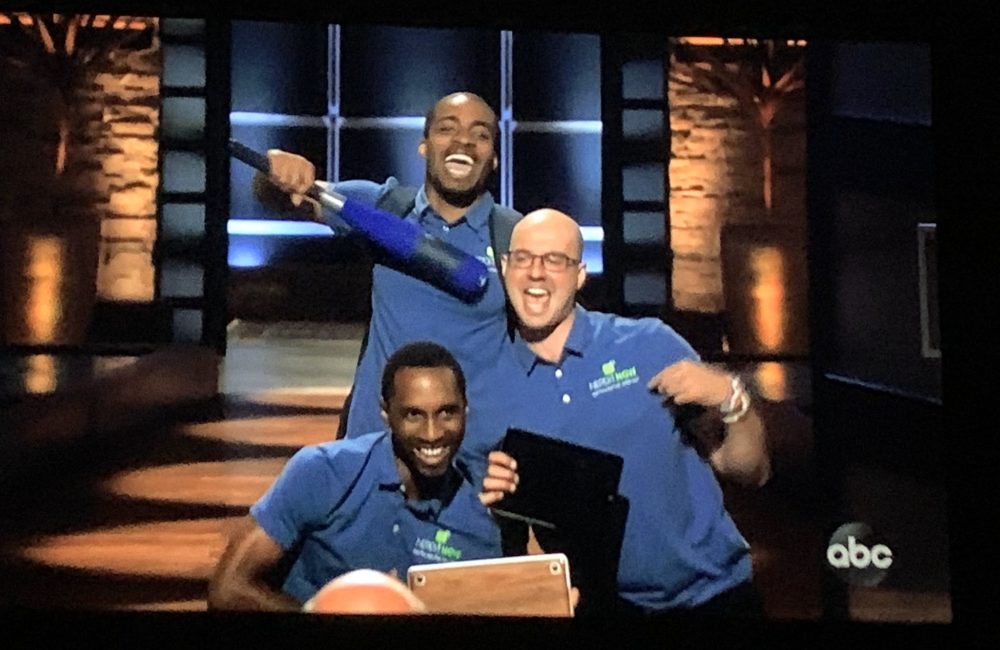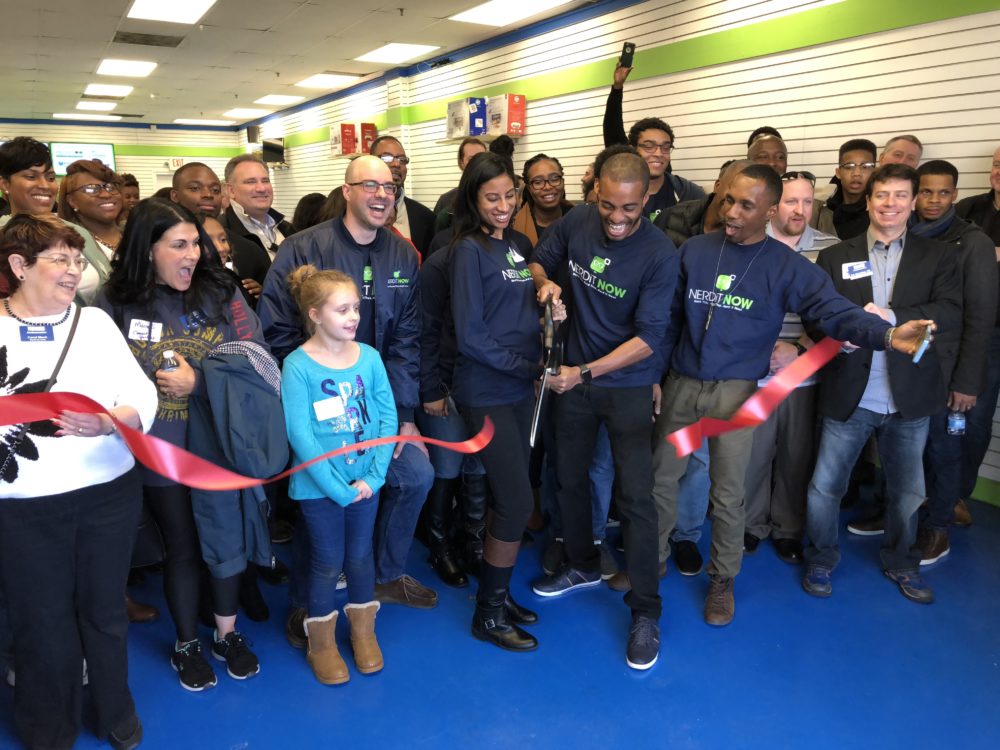NERDiT NOW, the Wilmington computer repair biz with a storefront in Newport’s First State Shopping Center, has been getting a lot of well-deserved attention lately. In October, its founders appeared on ABC’s Shark Tank — and while they didn’t land a deal with a celebrity investor, the appearance alone boosted the five-year-old company’s profile in Delaware.
NERDiT, which took off after placing second on the alumni track at Hen Hatch 2016, was founded by Markevis Gideon and CFO Jonathan Hoxter with a goal to be more than a reliable repair shop. Gideon, who runs the startup with business partner Jake Voorhees, was also committed to using his skills to give back to the community.
The company’s nonprofit, the NERDiT Foundation, provides computers for free to community members that need them. It started when, one day in the early days of the company, a mother came to Gideon hoping to find a used computer she could afford for her son to use for school. Without hesitation, he gave her a refurbished laptop for free. Since then, Gideon, Voorhees and a small team have refurbished and donated hundreds of computers to kids in the community, even funding whole computer labs, such as the one at the St. Patrick’s Center. They’ve send laptops to Ghana and Kenya via the Delaware nonprofit Water Is Life Kenya.
When COVID-19 hit Delaware and local children were ordered to stay home and learn online, the NERDiT Foundation went into overdrive. Since mid-March, the org has distributed over 800 laptops to the community, including 40 to Warner Elementary students.
NERDiT’s nonprofit COVID-19 work was funded by Discover Bank, which granted $75,000 for the project.

Accordingly, the team has been hailed in the community for their work. That doesn’t mean it’s been able to avoid business challenges, though.
“I was in one conference where someone said, ‘You guys are getting more coverage than the governor has in the past few weeks,” Gideon told Technical.ly. “It’s kind of interesting to see the fact that we’re everywhere, from the University of Delaware, Sen. [Chris] Coons has done a video for us, we have different high-up people [cheering us]. But what people don’t realize that it’s actually very much of a struggle still trying to scale our business.”
We're seeing more opportunity in Philadelphia, and we're not a Philadelphia business.
Like many small businesses, they applied — and reapplied — for Payroll Protection Program (PPP) funding to help keep the business afloat during the pandemic.
And like 95% of Black-owned small businesses, they didn’t get a check to cover three months of payroll and rent.
With no relief funding approved for the business, they turned to Franklin Mint, account holder of the nonprofit. Via the NERDiT Foundation, they managed to collect just $5,000 in PPP.
To put that into perspective, white business owner Zach Phillips disclosed in an op-ed “Confessions of a looter” (which is specifically about this kind of discrepancy) that his business, Short Order Productions, received over $177,000 in PPP. Even taking into account that NERDiT is smaller than Short Order, that is a massive gap.
“$5,000 doesn’t even cover one month,” Gideon said.
On top of that, while Gideon and Voorhees were being hailed for the work they were doing, they were receiving very few business contracts for services such as bringing the NERDiTmobile to places of business and employee repair services.
“We’re seeing more opportunity in Philadelphia, and we’re not a Philadelphia business,” Gideon said. “Right before corona happened, we were in communication with a lot of people in Philadelphia and they were talking about giving us free space, paying for a workforce development program. They were talking about 10- to 15,000 square feet for free. We realized, ‘Oh, they just want us to move our business to Philadelphia.'”
But moving the business, he said, it not an option at this point: “As much as I love the idea of scaling up the business, this is home. I’m trying to stick around.”

Politics compound the issue.
“I’m starting to garner relationships with some of the larger financial institutions, and there are some that try to help as much as they can, and I think a lot of it is still in the politics here,” he said. “Politicians want to say they’re here for the community. [Buccini/Pollin Group] gets these million-dollar grants to build hotels, yet a small minority-owned business that is actually here for the community isn’t getting anything.”
Government programs like 8(a) and HUBZone, which are there to support minority-owned businesses, have been rife with mismanagement and fraud on the national level, preventing millions from ever actually getting to a minority-owned business.
“Having the opportunity with no resource to get there, that’s a big injustice for minority-owned businesses,” Gideon said. “Or they may give us resources, but they don’t show us the opportunity. It’s a juggling act trying to figure out how to maneuver here in Delaware.”
Maybe we need to get rid of the tokenism and just spread the wealth among us all.
Delaware, Gideon said, is pretty decent when it comes to getting support for launching a new minority-owned business.
“But where it gets lost is when you’re no longer beginning,” he said. “I’m now moving into this intermediate level, and we’re just lost, there’s no support. But then when you make it to the super-filthy-rich [level], all the support comes back 10 times forward. Like, OK, you missed a step.”
Certainly, COVID-19 has had a lot to do with the lack of business contracts over the last few months. Still, he said, the lack of support is draining. It doesn’t help that customers who come into the shop in suburban Newport have become increasingly disrespectful and downright racist toward him since widespread Black Lives Matter protesting began.
“I had a lady come in yell “I’m for Trump!” he said. “A guy brought in a phone to be repaired and said, ‘My contact list is worth more than your Black-owned business.'”
And these are customers.
He shakes his head.
There are bright spots, though.
“We got two huge grants from Discover and Capital One and we’re working with Barclays,” Gideon said. “They’re seeing our drive. They’ve been trying. I see [founder of The Mill] Rob Herrera as a great resource for the community and a mentor.”
Elsewhere, True Access Capital — fka First State Community Loan Fund — “has been such a champion for us. Since starting, they offered us our first business loan, they give us a lot of consulting, help us find grant funding and help find the next move to make. There are great organizations like that. The Launcher program over at West End Neighborhood House, they’re doing some great things. We’re trying, we’re creating this pipeline of minority owned businesses, but again, they only get so far.”
At the end of the day, it’s apparent creating separate tracks for underrepresented businesses is not leveling the playing field.
“Maybe we need to get rid of the tokenism and just spread the wealth among us all,” he said.







